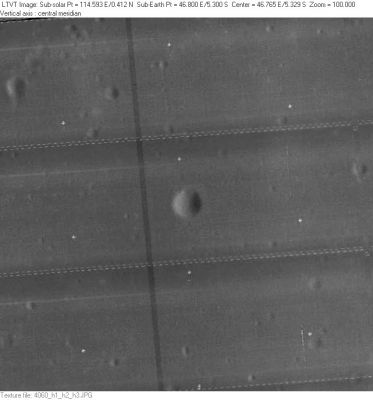Amontons
Contents
Amontons (known as Messier DB on AIC map 79B)
|
Lat: 5.3°S, Long: 46.8°E, Diam: 2 km, Depth: 0.2 km, Rükl: 48 |
LO-IV-060H
Craterlet Amontons (once called Messier DB)
Images
LPOD Photo Gallery Lunar Orbiter Images
Small crater Amontons was also captured on two of Apollo 16's orbital ITEK-panoramic frames:
AS16-P-4466 (to detect Amontons, scroll to the right beyond the frame's centre, Amontons is located about "halfway" between the frame's centre and the right margin).
AS16-P-4471 (same technique as described above).
Research: Danny Caes
Maps
(LAC zone 79B3) LAC map Geologic map AIC map LTO map
Description
Amontons is an unremarkable crater about 220 km northwest of the center of Mare Fecunditatis.
Description: Wikipedia
Additional Information
Depth data from Kurt Fisher database
- Westfall, 2000: 0.2 km
- The shadows in LO-IV-160H suggest a depth of around 400 m. - Jim Mosher
Nomenclature
Guillaume Amontons (August 31, 1663 - October 11, 1705) was a French scientific instrument inventor and physicist. Among his contributions to scientific instrumentation were improvements to the barometer (1695), hygrometer (1687), and thermometer (1695), particularly for use of these instruments at sea. Amontons investigated the relationship between pressure and temperature in gases though he lacked accurate and precise thermometers. His work led him to speculate that a sufficient reduction in temperature would lead to the disappearance of pressure. Thus, he is the first researcher to discuss the concept of an absolute zero of temperature.
- The name Amontons was provisionally introduced on LTO-79B3 (for which it served as the chart title). It was not formerly named. - Jim Mosher
- According to AIC map 79B, this craterlet was once called Messier DB.
- What was the "scientific" reason to give such an unremarkable small crater the officially recognized name Amontons? Was there a scientific reason? - DannyCaes Apr 23, 2017
LPOD Articles
Bibliography
